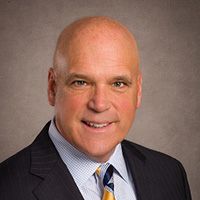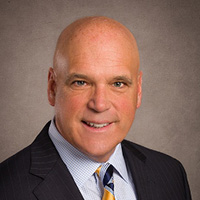Why a Massive Retirement Rush Is Underway
Older workers in many fields are feeling the urge — or the push — to retire. The question is, are they ready?


Profit and prosper with the best of Kiplinger's advice on investing, taxes, retirement, personal finance and much more. Delivered daily. Enter your email in the box and click Sign Me Up.
You are now subscribed
Your newsletter sign-up was successful
Want to add more newsletters?

Delivered daily
Kiplinger Today
Profit and prosper with the best of Kiplinger's advice on investing, taxes, retirement, personal finance and much more delivered daily. Smart money moves start here.

Sent five days a week
Kiplinger A Step Ahead
Get practical help to make better financial decisions in your everyday life, from spending to savings on top deals.

Delivered daily
Kiplinger Closing Bell
Get today's biggest financial and investing headlines delivered to your inbox every day the U.S. stock market is open.

Sent twice a week
Kiplinger Adviser Intel
Financial pros across the country share best practices and fresh tactics to preserve and grow your wealth.

Delivered weekly
Kiplinger Tax Tips
Trim your federal and state tax bills with practical tax-planning and tax-cutting strategies.

Sent twice a week
Kiplinger Retirement Tips
Your twice-a-week guide to planning and enjoying a financially secure and richly rewarding retirement

Sent bimonthly.
Kiplinger Adviser Angle
Insights for advisers, wealth managers and other financial professionals.

Sent twice a week
Kiplinger Investing Weekly
Your twice-a-week roundup of promising stocks, funds, companies and industries you should consider, ones you should avoid, and why.

Sent weekly for six weeks
Kiplinger Invest for Retirement
Your step-by-step six-part series on how to invest for retirement, from devising a successful strategy to exactly which investments to choose.
COVID-19 has changed the complexity of work, and a massive retirement rush is underway. With companies starting to return to the office or deciding to close for good, many employees between the ages of 58 and 65 are finding themselves contemplating retirement earlier than expected.
If you were close to retirement anyway, you may be wondering if returning to work is really worth the hassle and the risk to your health. It's time to stop wondering and work with a financial planner to see whether you can retire comfortably with reliable income sources.
The reality for older workers
This pandemic-prodded surge in people contemplating early retirement may be partly attributable to their getting used to having no commute and living in “athleisure” attire. Now, they are dreading a return to work attire and rush-hour traffic. However, for many, this contemplation is driven far more by the daunting fact that their work environments and expectations will be drastically changed when they return.
From just $107.88 $24.99 for Kiplinger Personal Finance
Become a smarter, better informed investor. Subscribe from just $107.88 $24.99, plus get up to 4 Special Issues

Sign up for Kiplinger’s Free Newsletters
Profit and prosper with the best of expert advice on investing, taxes, retirement, personal finance and more - straight to your e-mail.
Profit and prosper with the best of expert advice - straight to your e-mail.
Teachers, for example, have had to master new technology and revamp their techniques for engaging students and providing feedback without the structure of a classroom. Working in a home environment with many distractions creates a stressful environment for everyone. A National Education Association poll found 28% of teachers said the COVID-19 pandemic made them more likely to retire early or change professions. In school districts opting for in-person classes, the numbers are higher, particularly for more experienced (i.e., older) teachers.
Health care workers are facing two realities in the crisis: Those on the front line are dealing with the stress of risking their health while being surrounded by the virus all day. Others have been laid off as elective procedures and non-emergency doctor and dentist visits are postponed indefinitely.
These examples illustrate some reasons early exits from the labor force are growing. Experts predict an estimated 4 million older workers will have left the labor force by October. This does hurt retirement savings in what would have been the crucial final years in the workforce, but many are finding their options are limited.
There is also a continued erosion of seniority-based advantages in the workplace and, while illegal, discrimination in hiring someone close to retirement age given the health risks and other concerns. As a result, since the pandemic began, 42% of older workers who lost their jobs say they've retired. Conversely, only 28% of older workers who became unemployed during the 2007-2008 recession said they had retired.
Best-laid plans
So, what is the main hesitation people have when deciding whether to leave the workplace early? A misconception that they can't afford to retire. That may be true for some. However, many are pleasantly surprised to find that, after reviewing their accounts and options with a financial planner, they are financially able to retire. This helps alleviate the stress caused by uncertainty, and provides people with reassurance and options.
Even when many older workers realize they have the financial stability to retire, they find that pulling the ripcord on a career requires a mindset shift. Besides adjusting to a new schedule, the transition involves reshaping your lifestyle and goals. Many focus initially on travel, hobbies or volunteering to derive a new self-identity, particularly if they found great satisfaction in their careers. However, mentally shifting the work-life balance also includes shifting from being a saver to a spender — within new financial realities.
Accordingly, meeting with a financial planner should be a critical first step in the planning process. It will help you identify your future sources of income, ways to continue growing your money, expenses to address and other factors. As financial planners, we note the sigh of relief from clients who realize they have what they need to retire comfortably.
Financial planning process
The financial planning process often starts with identifying assets that can be used for income. A retirement income model can help identify income sources to ensure a steady flow of income throughout retirement, such as real estate, pensions, retirement funds (potential IRA, 401(k) rollover balances), investments and other potential income streams. The next step is helping you analyze your possible Social Security benefits and when to claim them. Then, you factor in realistic expenses, such as health care, that are likely to increase considerably over your remaining lifetime. Finally, the process ends with helping you develop an investment strategy, including what assets, if any, to put in an annuity as a steady income source.
A mere generation ago, retirement was more predictable. People reached 65, signed up for Social Security and Medicare, and started receiving pension payments.
Now, with only 13% of Americans having pensions and the coronavirus forcing more workers to consider retirement, the picture has changed dramatically. Retirement comfort is based on assets rather than a pension, and financial planners are here to assist you with turning your assets into income. Amid the uncertainty created by COVID-19, advisers aim to structure retirement plans with as much certainty and as little risk as possible to ensure a steady income if you are contemplating or forced into early retirement.
The pandemic has spurred many older workers in fields such as education, health care and hospitality into unplanned early retirement, or the possibility of it. But many are finding that with the help of a financial planner, they can weigh the risks and benefits of returning to work and decide whether retiring sooner than expected is possible. Meeting with a financial planner can give workers approaching retirement the tools and peace of mind they need to be prepared.
Jeffrey E. Bush is an investment adviser representatives of, and securities and advisory services are offered through, USA Financial Securities Corp., Member FINRA/SIPC. www.finra.org A Registered Investment Adviser located at 6020 E. Fulton St., Ada, MI 49301. Informed Family Financial Services, Inc. is not affiliated with USA Financial Securities.
Profit and prosper with the best of Kiplinger's advice on investing, taxes, retirement, personal finance and much more. Delivered daily. Enter your email in the box and click Sign Me Up.

Jeffrey E. Bush is the Managing Partner and Chief Operating Officer of Informed Family Financial Services and has been dedicated to providing high-quality service to his clients since 1994. Jeff received his MBA in Finance from St. Joseph's University and graduated magna cum laude from Alvernia University majoring in Business Management. He holds professional licenses, which include Series 6, 7, 63, and 65.
-
 Nasdaq Leads a Rocky Risk-On Rally: Stock Market Today
Nasdaq Leads a Rocky Risk-On Rally: Stock Market TodayAnother worrying bout of late-session weakness couldn't take down the main equity indexes on Wednesday.
-
 Quiz: Do You Know How to Avoid the "Medigap Trap?"
Quiz: Do You Know How to Avoid the "Medigap Trap?"Quiz Test your basic knowledge of the "Medigap Trap" in our quick quiz.
-
 5 Top Tax-Efficient Mutual Funds for Smarter Investing
5 Top Tax-Efficient Mutual Funds for Smarter InvestingMutual funds are many things, but "tax-friendly" usually isn't one of them. These are the exceptions.
-
 Social Security Break-Even Math Is Helpful, But Don't Let It Dictate When You'll File
Social Security Break-Even Math Is Helpful, But Don't Let It Dictate When You'll FileYour Social Security break-even age tells you how long you'd need to live for delaying to pay off, but shouldn't be the sole basis for deciding when to claim.
-
 I'm an Opportunity Zone Pro: This Is How to Deliver Roth-Like Tax-Free Growth (Without Contribution Limits)
I'm an Opportunity Zone Pro: This Is How to Deliver Roth-Like Tax-Free Growth (Without Contribution Limits)Investors who combine Roth IRAs, the gold standard of tax-free savings, with qualified opportunity funds could enjoy decades of tax-free growth.
-
 One of the Most Powerful Wealth-Building Moves a Woman Can Make: A Midcareer Pivot
One of the Most Powerful Wealth-Building Moves a Woman Can Make: A Midcareer PivotIf it feels like you can't sustain what you're doing for the next 20 years, it's time for an honest look at what's draining you and what energizes you.
-
 I'm a Wealth Adviser Obsessed With Mahjong: Here Are 8 Ways It Can Teach Us How to Manage Our Money
I'm a Wealth Adviser Obsessed With Mahjong: Here Are 8 Ways It Can Teach Us How to Manage Our MoneyThis increasingly popular Chinese game can teach us not only how to help manage our money but also how important it is to connect with other people.
-
 Looking for a Financial Book That Won't Put Your Young Adult to Sleep? This One Makes 'Cents'
Looking for a Financial Book That Won't Put Your Young Adult to Sleep? This One Makes 'Cents'"Wealth Your Way" by Cosmo DeStefano offers a highly accessible guide for young adults and their parents on building wealth through simple, consistent habits.
-
 Global Uncertainty Has Investors Running Scared: This Is How Advisers Can Reassure Them
Global Uncertainty Has Investors Running Scared: This Is How Advisers Can Reassure ThemHow can advisers reassure clients nervous about their plans in an increasingly complex and rapidly changing world? This conversational framework provides the key.
-
 I'm a Real Estate Investing Pro: This Is How to Use 1031 Exchanges to Scale Up Your Real Estate Empire
I'm a Real Estate Investing Pro: This Is How to Use 1031 Exchanges to Scale Up Your Real Estate EmpireSmall rental properties can be excellent investments, but you can use 1031 exchanges to transition to commercial real estate for bigger wealth-building.
-
 Should You Jump on the Roth Conversion Bandwagon? A Financial Adviser Weighs In
Should You Jump on the Roth Conversion Bandwagon? A Financial Adviser Weighs InRoth conversions are all the rage, but what works well for one household can cause financial strain for another. This is what you should consider before moving ahead.